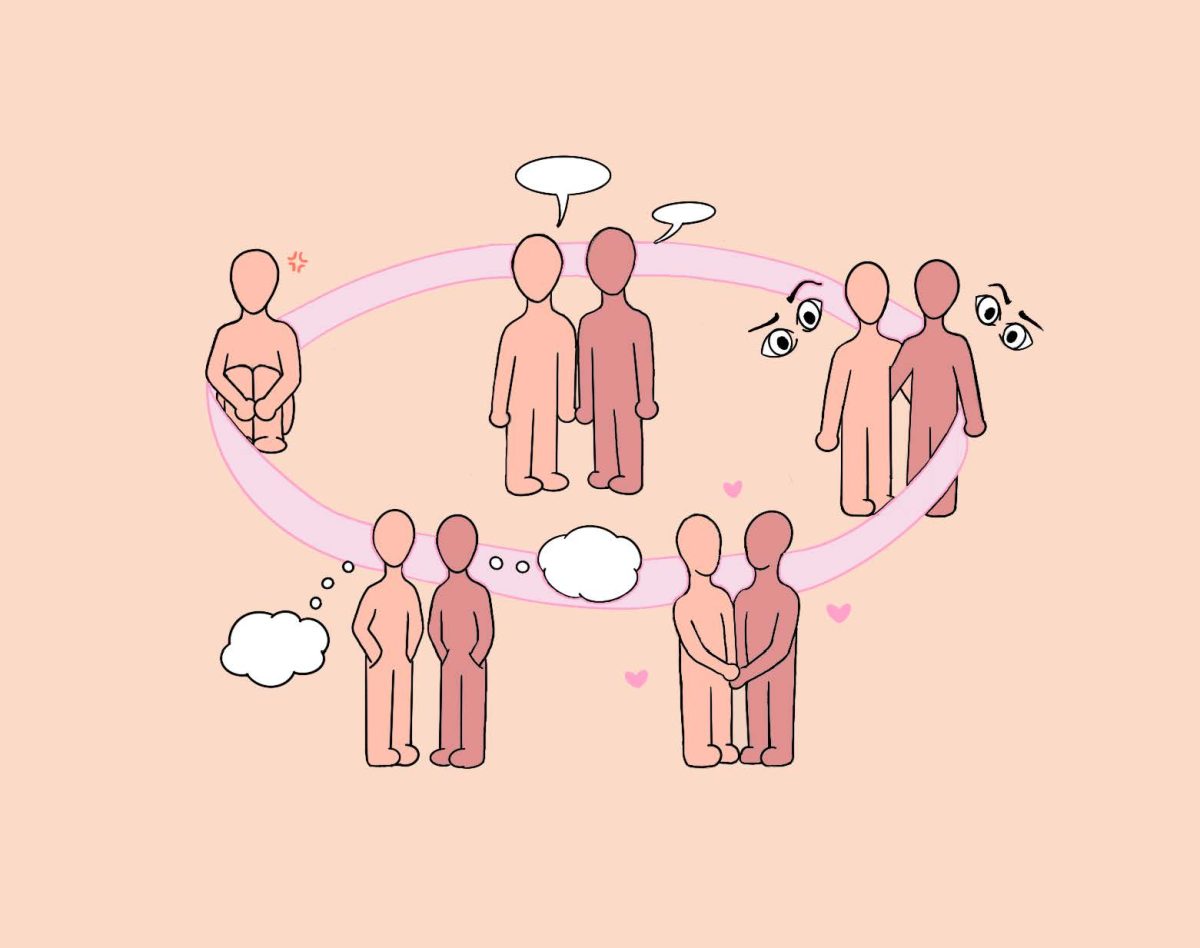Senior Alana Madeline* (she/her) was in a “talking stage” with her ex-boyfriend for 3 months before they made it official. They dated for nine months before he broke up with her because of his commitment issues. In a survey of 93 Inglemoor students, 59 said that they’ve been in a relationship. Of those 59, 51 said they are no longer with that person. While to some students, Inglemoor’s dating scene is overwhelmingly made up of long-term relationships, there’s also been a significant number of breakups.
“I feel like it’s an age thing. When you’re young, I feel like high school relationships are so romanticized with the media and stuff. I feel like people just get really excited about dating someone in high school. And then no matter how bad it is it’s like,‘Oh, I’m gonna stay because this is my first relationship,’ Madeline said.
Junior Emily Hardy* (she/her) also endured a recent breakup. She attributed their breakup to a difference in romantic experience, since their relationship was her third, but her ex-boyfriend’s first relationship. While she said the break up came as a surprise to her due to the lack of issues present in the relationship, she hopes that her ex will reflect on his actions and overcome his fear of commitment.
“Three months in he realized this is his commitment. But I don’t think that it’s because he didn’t want the commitment. I just think that he wasn’t expecting it. And so his reaction was just, ‘Let’s get out of it,’” Hardy said. “But I think over the next couple days and during the next month, he’s gonna realize, wait, this is the commitment that I want. And I think he’s gonna come back.”
The “three month rule” has recently gone viral on various social media platforms, particularly TikTok. It states that after the first three months of a relationship, the “honeymoon” phase ends, and you begin to see your partner’s true nature, causing many relationships to end around the third month.
Madeline said that her ex stopped putting as much effort into their relationship after a few months. She said that the monotony of their dates, which increased after they were both comfortable in the relationship, caused her to want him to put more energy into the relationship.
“I feel like around the three month mark, I was starting to realize that our dates were literally just the same. It would be the same exact thing every single time I’d see him. Because he goes to another school, I’d only see him once a week, so every Saturday, we would just go get coffee, and there wasn’t really any change or anything special,” Madeline said.
Senior Harper Christensen* (she/her) said the three month rule played a role in her decision to recently break up with her boyfriend. She said that because they knew they would eventually have to break up before college after the summer, and her own trust issues, she decided her feelings weren’t strong enough to last past the three month mark.
“I never talked about it with him, but I was definitely saying with my friends ‘Oh, three months is when you’re supposed to feel this certain. And I’m not feeling that way,’” Christensen said.
Both Madeline and Christensen emphasized the importance of spending enough time with a potential partner before deciding to date. Christensen said that while her two month talking stage seemed short to her, friends and family put pressure on the couple to make it official.
“When it’s a short talking stage, you’re literally acting for the first two months. You’re putting on the best version of yourself for the first two months, but then once they get you locked in, they start showing their true colors. And then it’s safe for them. Because you’re in too deep,” Christensen said.
After breakups, some students say that they see a decline in their social and academic lives that correlates with a dip in their mental health. Madeline said that constantly being with her ex boyfriend, as well as turning to him for academic help, caused them to develop an unhealthy attachment to each other, leaving her unsure of how to move forward.
“In my mind, he was more important than my friendships. It was very much a codependency. We were just hanging out with each other. I wasn’t even hanging out with my friends anymore. I was just hanging out with him,” Madeline said.
However, Madeline said that after their breakup, her friends were her largest support system, and they became closer than they had since she started dating her ex due to their attachment to one another. She said that this was the largest positive she experienced after her relationship ended.
“Socially, I started to get really close to my friends and stuff like that. I feel like it helped me realize the importance of having friendships, especially through breakups, because it makes you feel like you’re not alone instantly,” Madeline said.
In addition to a decline in her social health, freshman Ryleigh Cooper (she/her) experienced a steep decline in her academic life. After getting cheated on during her year-long relationship with her ex-girlfriend, Cooper’s mental health saw a steep and sudden drop after the break up.
“I was not willing to go to school because I did not want to see her. And it was a private school, so everybody kind of knew each other. And I was super depressed for a long time,” Cooper said. “My grades started to really down fall. And I was racking up a lot of missing assignments. I wasn’t doing so great. I used to be an A and B student, and I ended up being a C and D student.”
Some students also feel that the negative experiences from their past relationships will negatively affect their future relationships. When sophomore Megan Boone* (she/her) ’s ex-girlfriend experienced a manic episode due to her mental health struggles and left the state, it caused Boone to question her future relationships.
“I think that my relationship impacted me in the way that if someone’s sad, but they don’t tell me, I think that they’re gonna lash it all out at once. And it’s gonna make me really sad. So I wouldn’t say it’s trust issues but it’s definitely something,” Boone said.
While junior Dexter Abbott* (he/him) has experienced many issues in his current relationship, he believes that the positives of dating in high school are worth the tribulations. When he and his current girlfriend broke up briefly at the end of last school year, it gave him a chance to reflect on both himself and what he desired out of his relationship. He stressed that the most important aspect of any relationship is good communication, and that without it, the relationship won’t last.
“If there’s something your partner’s doing wrong like let’s say, they don’t hold your hand in public, if you keep that in, they’re not going to change,” Abott said. “You just gotta tell them, ‘Hey, can we do this? Or hey, I don’t like it when you do this because it makes me feel this way’. And a lot of kids this age don’t do that. I didn’t do that. And I’m not 100% there right now, but I think I’m growing. And that’s what life’s all about.”











